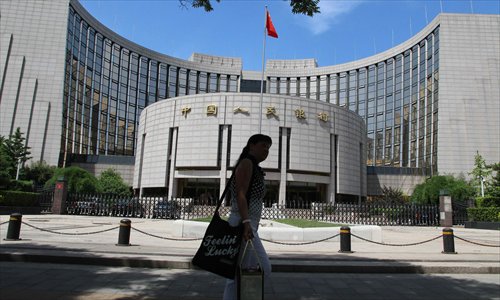HOME >> BUSINESS
PBC to introduce its own digital currency: official
By Ma Jingjing Source:Global Times Published: 2019/11/21 16:10:22

A passenger walks past PBC's headquarters in Beijing on May 16. Photo: CFP
The People's Bank of China (PBC), the country's central bank, has made "impressive" achievements in the study of digital currencies over the past five to six years and will likely to introduce its own digital currency in the future, Huang Qifan, vice president of the China Center for International Economic Exchanges, told the Global Times on Thursday.
"The central bank has carried out in-depth and due studies on a digital currency. The progress is very good, so I think the central bank will likely introduce its own digital currency in the future," Huang said on the sidelines of the New Economy Forum held in Beijing.
Huang, a former mayor of Southwest China's Chongqing Municipality, said at the Shanghai Bund Summit in October that the PBC is likely to be the first central bank globally to introduce its own digital currency.
The PBC's plan has gained renewed attention with China's top leadership calling for more efforts in blockchain development, lifting the whole sector.
Facebook launched the ambitious Libra project in June, aiming to issue a blockchain-based cryptocurrency for its billions of users and others around the world, bypassing central banks and banking systems.
Huang said that the central bank's digital currency will be a fiat currency, completely different from blockchain-based Bitcoin.
Bitcoin is merely speculative, Huang said. "Bitcoin is volatile, and its price may surge or slump 50 percent. Therefore, it can't be a currency, as a currency has to be largely stable with slight fluctuations," he said.
"People even don't know who the inventor of Bitcoin Satoshi Nakamoto is. How can it become a true digital currency, let alone a legal digital currency?" Huang added.
However, Huang applauded the central government's forward-looking blockchain deployment.
"Applying digitalization - including artificial intelligence, blockchain, cloud computing and big data - in traditional industry chains can develop new economic forms," he said. For example, digitalization combined with the development of cities can form smart cities. Combined with logistics, it can form smart logistics, he said.
Unlike the opening-up of China's special economic zones in coastal areas, the country's call for digital development applies to the eastern, middle and western regions equally, Huang said.
"Each domestic city can make plans and boost the development of the digital economy in line with the central government's guidance," Huang said, noting that they are at the same starting point.
Posted in: ECONOMY